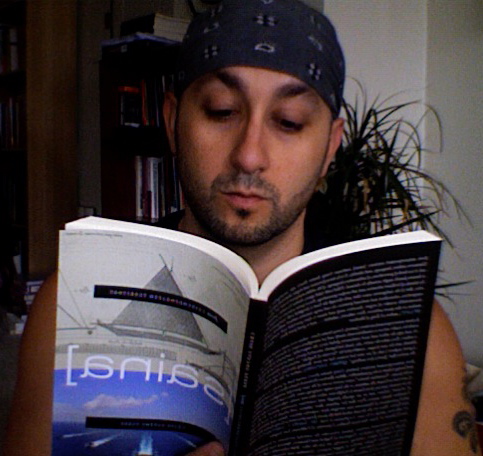Last fall, P&W co-sponsored a reading and workshop with poet Craig Santos Perez at University of California in Santa Cruz, where we have supported literary events since 2003. Perez also happens to be a past recipient of P&W’s California Writers Exchange Award, a prize that introduces promising California poets and writers to New York City’s literary community. We asked Perez how he approaches giving a reading.
Reading dos: Smile. Give thanks to the organizers, fellow performers, and the audience members. Drink water. Mark the pages you're going to read. Be prepared and organized. Be composed. Read your best work. Make eye contact with the audience. Share some background to the work. Read with passion. Reading don’ts: Don't read too quietly. Don't shuffle through papers as if you just rolled out of bed. Don't say that you're going to read from your book that you don't like anymore because you wrote it a year ago. Don't talk for too long about the background of a poem. Don't drink water in the middle of a poem. Don't read drunk or high (unless that's part of your aesthetic). Don't go over time. Don't read too fast. Don't be hostile to the audience during Q&A. Do not not smile.
Reading don’ts: Don't read too quietly. Don't shuffle through papers as if you just rolled out of bed. Don't say that you're going to read from your book that you don't like anymore because you wrote it a year ago. Don't talk for too long about the background of a poem. Don't drink water in the middle of a poem. Don't read drunk or high (unless that's part of your aesthetic). Don't go over time. Don't read too fast. Don't be hostile to the audience during Q&A. Do not not smile.
How you prepare for a reading: I prepare for a reading by figuring the best set list possible based on the time I'm given to perform, the venue, the organizer(s), the audience demographic, and my mood. I try to choose a mix of published and new work. I rehearse my performance beforehand, making sure I have the timing down. For my reading at UCSC, I also brought some gifts (free books and a can of SPAM) for the audience members who asked me questions during the Q&A.
Strangest comment you’ve received from an audience member: Last March I read at a social workers conference in Guam and was asked, by a much more experienced woman (as in thirty years older), "Are you married?" I barely made it out of that room alive.
What’s your crowd-pleaser, and why it works: I have different poems that could ignite very different pleasures. For the pleasure of laughter: "Spam's Carbon Footprint." For the pleasure of emotional resonance: "from Aerial Roots" (from my second book). For the pleasure of resistance: "from Achiote" (from my first book).
But this is not always true because you can never read to the same crowd twice. Which is to say, all crowds are different and unpredictable and a writer has to be flexible, especially writers of color. Sometimes a poem that gives a certain kind of pleasure to one audience (let's say, composed of all native peoples) may not give the same pleasure (or any pleasure at all) to another audience (let's say, composed of all white peoples).
How giving a reading informs your writing and vice versa: If I read new work, I always find little edits I should make. So in that sense, it's good for revision. The more readings I've done over the years, the more connected I feel to the tradition of oral poetics and spoken word. I find myself using more oral poetry techniques in my work than ever before.
What you probably spent your R/W grant check on: I spend all the money I receive from reading gigs to buy more poetry books!
Major support for Readings/Workshops in California is provided by The James Irvine Foundation. Additional support comes from the Friends of Poets & Writers.




